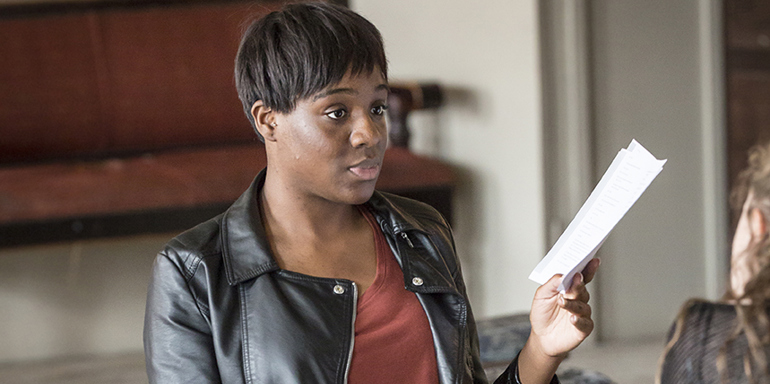Got an audition coming up for drama training?
Auditions can feel nerve-wracking for any performer, which is why careful preparation is so important. Being well prepared can help to put your mind at ease and focus on putting your best self across on the day.
Read our top tips to help you make the most out of your audition!
First of all…
The audition requirements for each of our drama training programmes differ – so do make sure that you have thoroughly read all of the audition requirements for your chosen programme.

Choosing your piece
Choosing the right piece is crucial to the success of your audition, your choice will help to demonstrate who you are as an artist. Programme Leader for Acting & Actor Musician, Erin Carter advises; “It’s important to be yourself at audition – choose material that you really enjoy performing and that you want to have an audience for – it will help us see who you are.”
When it comes to choosing the right piece for your Musical Theatre audition, Programme Leader for Musical Theatre, Adam Stadius adds; “We recommend choosing songs that give us a sense of your own voice – so try and avoid anything with an overly-characterised tone. Monologues should be performed in your own accent, regardless of the setting – as we want to hear from YOU.”
Show your range
Whichever programme you are applying to, it’s a good idea to choose pieces that contrast and show your range as a performer. Erin’s advice for Acting auditions is; “If you’re familiar with classical plays or verse speaking, you might choose something that is Elizabethan, Shakespearean or Greek as a contrast to a more modern play. However, you can contrast style, character, language or tone.” The important thing for any audition is that you choose pieces that show off your ability.
Keep it manageable
It is important that you feel comfortable at your audition, so choose material that you are confident performing. Dermot Daly, Senior Lecturer for Acting says; “Avoid things that are going to just get in the way of your performance, like difficult accents, or characters who are a million miles away from who you are.”

Do your research
Whether you are performing a song or a speech, it is important that you are prepared to answer some questions about your chosen pieces – so make sure that you have researched them well. Erin recommends; “Read the play which your speech has come from. Know what has happened to the characters and understand what they want, why they are saying these words now, and what has changed by the end of the speech. The same applies to any songs or music you perform – know who wrote it, and where it has come from.
Focus on your strengths
Try to focus on what you can do well as a performer, rather than worrying about areas where you feel less confident. As Adam says; “Musical Theatre is a multidisciplinary genre and we expect people to have strengths and weaknesses in different areas. Try to focus on what you CAN do really well – and remember that we’re looking for potential – not the finished product.”
Make the most out of your interview
Our interviews are a relaxed and informal discussion where you will be asked about your interests, experience and your passion for the subject. It is also an opportunity for you to find out whether this is the right place for you to train too. Adam advises; “Bring lots of questions with you – this is your opportunity to find out everything you want to know about training here at the conservatoire – so please do ask away, there are no silly questions!”
Most importantly…
Try to relax and enjoy the day. Leeds Conservatoire auditions are free, so just imagine you are already here studying and enjoy a free day of classes with industry professionals – and the chance to do what you love. We are looking for people who are authentic and passionate - bring lots of energy and a willingness to throw yourself into the day!
Find out more about our drama training, in Musical Theatre, Acting or Actor Musician.
Read our audition and interview information.







